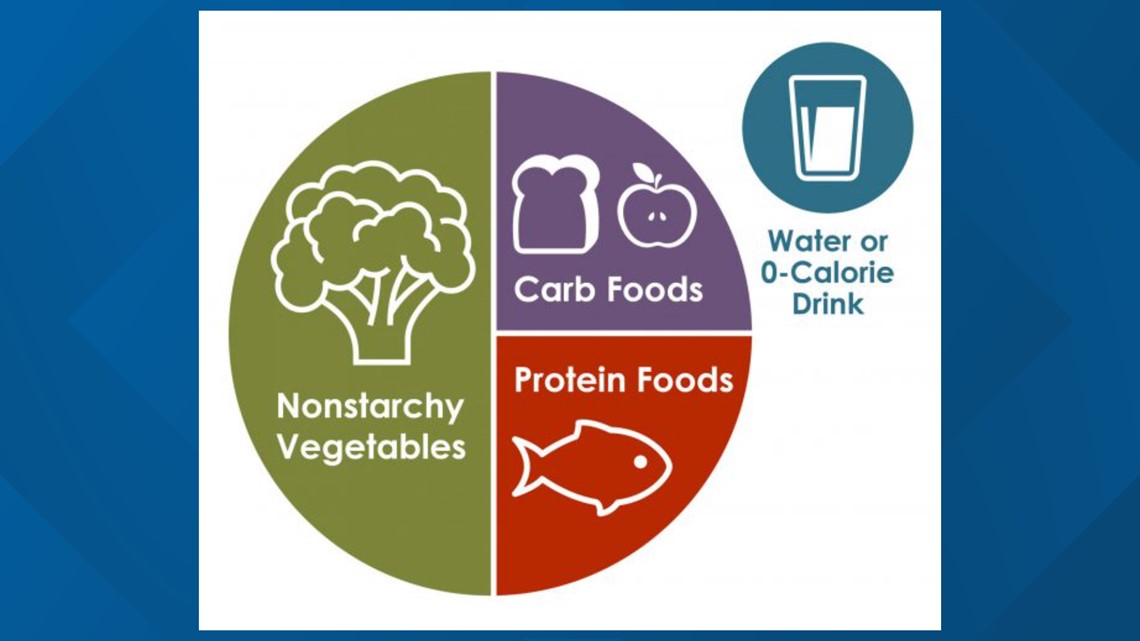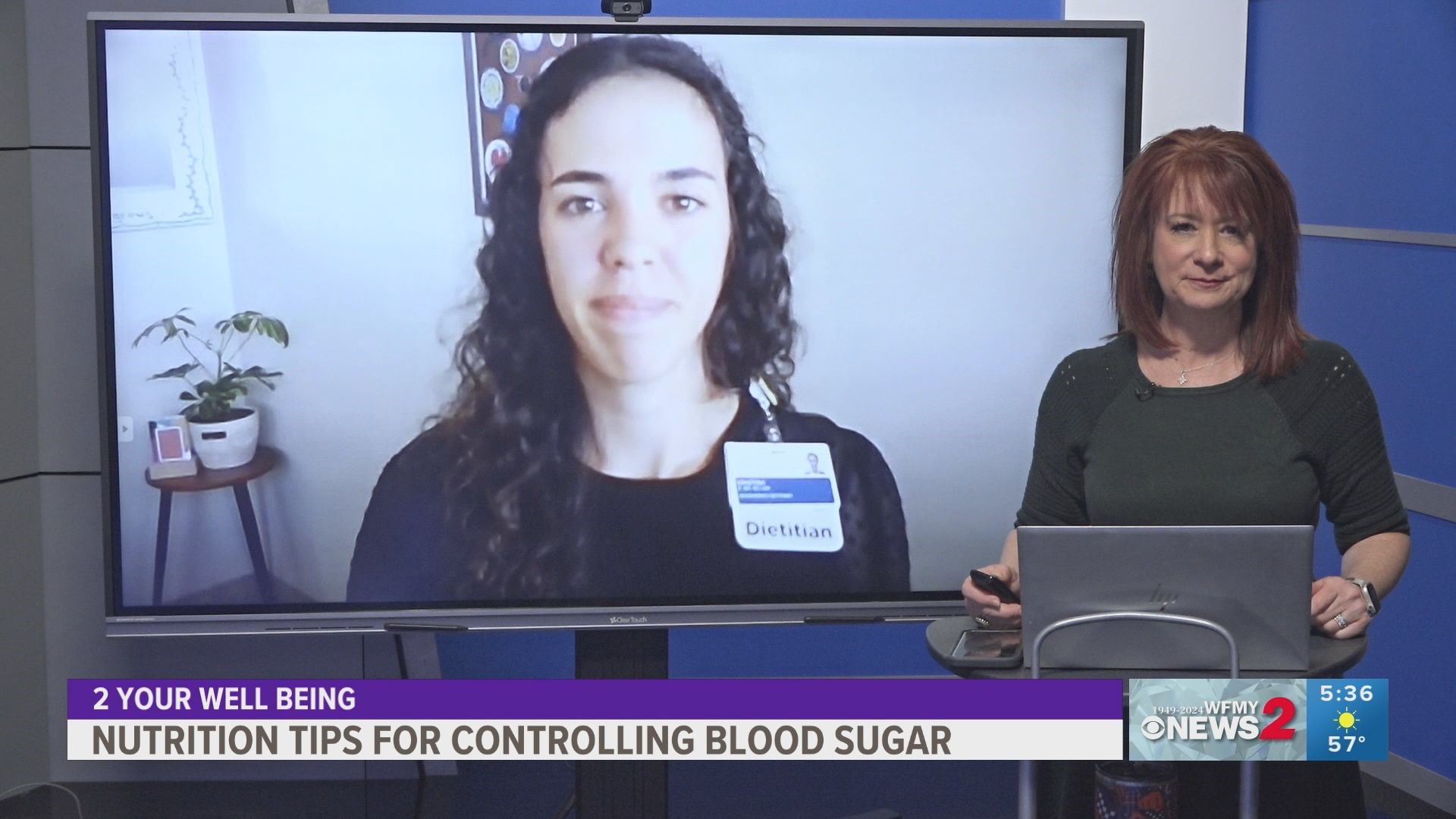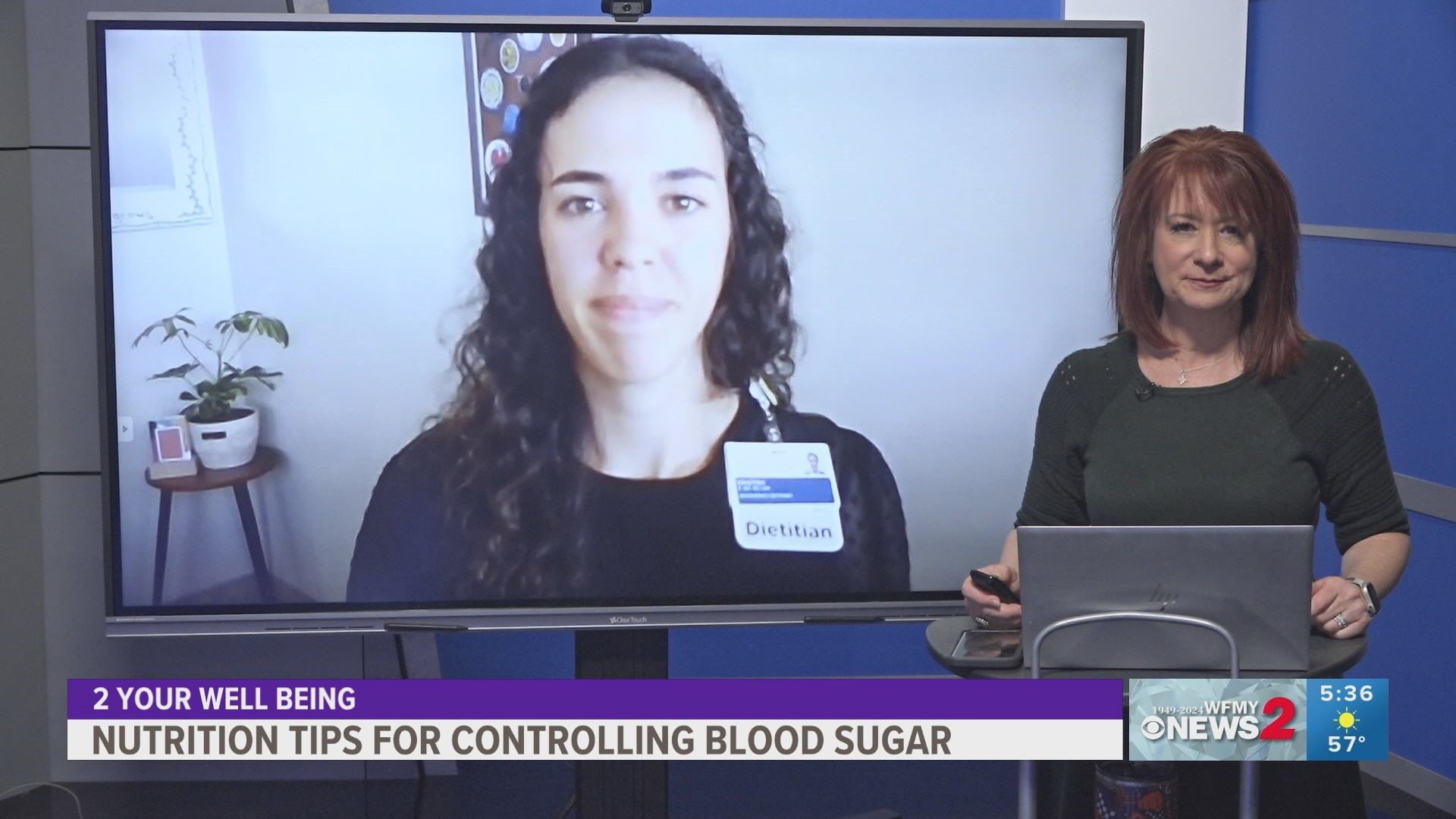GREENSBORO, N.C. — We're tackling an important topic affecting many of us and our overall health and well-being: sugar management - whether it's for prediabetes, diabetes, or just watching your intake.
Quick link: Nutrition counseling with Cone Health
Registered dietitian Kristina El-Khouri with Cone Heath Nutrition & Diabetes Education Services spoke with WFMY News 2 to dish out nutrition tips on meal planning and navigating sugar do's and don'ts.
Why is it important to control blood sugar and what are the health risks associated with high blood sugar?
"It's really important with we have diabetes or prediabetes to make sure our blood sugars are under control just because we know that if our blood sugars are high, it can put us at a higher risk of developing some chronic conditions like heart attack or stroke or you know even our kidney disease."
What are some simple meal planning strategies to help keep blood sugar levels stable?
"The easiest thing that I like to think of is kind of what we call the diabetes portion plate. Whenever we portion out our plates like this, it tends to help us have the best blood sugar control."


What are the most common pitfalls or "don'ts" that people should know when trying to manage their sugar?
"We don't want to completely cut these carbohydrates out of our diet. One of those big kind of pitfalls is when people think that they have to totally cut those carbs. We want to focus on the complex carbs, the starchy vegetables, fruits, whole grains, and then keeping it to that portion."
"Some other things are skipping meals. We want to try to avoid skipping meals, for sure. We need to have consistent meal times for stable blood sugars, and so if we skip a meal, it may tend to make us more hungry later on at a different meal time, and then we may overeat and cause a blood sugar spike. "
When someone’s blood sugar level is too high, what should they eat or drink to help bring it down?
"whenever our blood sugar is too high, we want to make sure that we're drinking a lot of water. Something else that we can do that naturally brings down our blood sugar is get some exercise. So even as little as a 15-minute walk can help bring our blood sugar down."
What should someone eat or drink if their blood sugars drop too low to raise it quickly?
"What you want to do is what we call the 15/15 rule. it just means drinking 15 grams of sugar, which would be about a half of a cup or four ounces of juice or regular soda, and then wait 15 minutes. Then you would want to check your blood sugar, and if it's up above 70, have a balanced snack that has a complex carb or protein. But if it's still low, then you want to repeat that process."
Are there some affordable pantry staples that we should stock up on when managing our sugar?
"Dried beans, canned beans...beans are going to be a huge as far as like affordable pantry stable because beans actually provide us with some complex carbs and protein. We can also look for whole grains, canned vegetables, frozen vegetables, and maybe even things like canned chicken breast or canned fish too."
If you are the only person in your household needing to watch their sugar levels, how do you stay on track and avoid temptations?
"Communicating your needs to your family is really important, but keeping a lot of your nutritious and filling snacks on hand. Those ones that we know help I'll balance our blood sugar. Keeping those, you know, at the forefront of the pantry, in the fridge, having them available is going to make us more likely to choose them."
"Instead of thinking, oh, we can't have that, we can have that and then it kind of builds up and we want all of them, have one of them take a few bites of one instead of just popping one all in your mouth and enjoy it. "
What are some sneaky sources of added sugars in everyday foods that people might not be aware of?
"Some of the common ones that you'll see are going to be things like honey, agave, maple syrup, or maybe even things like brown sugar or turbinado or raw sugar, so you might see those on the label. Those are sources of added sugars and they tend to be marketed in kind of a different way."
How can you spot hidden sugars when reading food labels to help make informed choices at the grocery store?
"On the side of your box, you do have a nutrient facts panel. Best place you can look for it is look down for total sugars and right under that it'll say added sugars and a good rule of thumb is looking for that added sugars to be in the single digits."
What about when you’re dining out, what are some tips on managing sugars then?
"When we dine out, we just want to continue to think about that kind of that diabetes portion plate. Whenever we're out to eat, we can still make our meal a really balanced and nutritious meal while still satisfying or craving for whatever we went out for."
How important is it for someone watching their sugar intake to stay hydrated, and what are some hydrating options that won't add unnecessary sugars?
"When we're dehydrated, it can actually raise our blood sugar a little bit. You know everybody in general needs to make sure that we're hydrated, right? But it can be especially important for people who are managing their blood sugar and so we definitely want to make sure that we're drinking enough water throughout the day. And you know, if we're having a hard time with that, maybe we flavor it with some lemon or lime or some people will do cucumber and mint maybe herbal teas or sparkling water or things like that."
Are there drinks to steer clear of?
"Well, if we're looking for, you know, hydrating options, you might see like Gatorade or Powerade. Those ones are gonna have a lot of added sugar, so we might want to try and avoid those when we're trying to just get hydrated. Of course, trying to limit the sugar-sweetened beverages like sodas, juices, sweet teas and lemonade. "
When should someone seek help from a medical professional about their blood sugars and what are the signs or symptoms we should be on the lookout for?
"Yeah, some signs of our blood sugar being too high are frequent urination so, you know, we're going to go pee a lot or feeling really really thirsty. Like we can't quench our thirst. And so if you were to check your blood sugar and maybe it's over 250, but you also feel like you might vomit or you have vomited. That's a sign to go seek medical attention or talk to your doctor. A sign that we may need to go immediately is if you check your blood sugar and your meter just reads as high H or it might say HIGH. "


